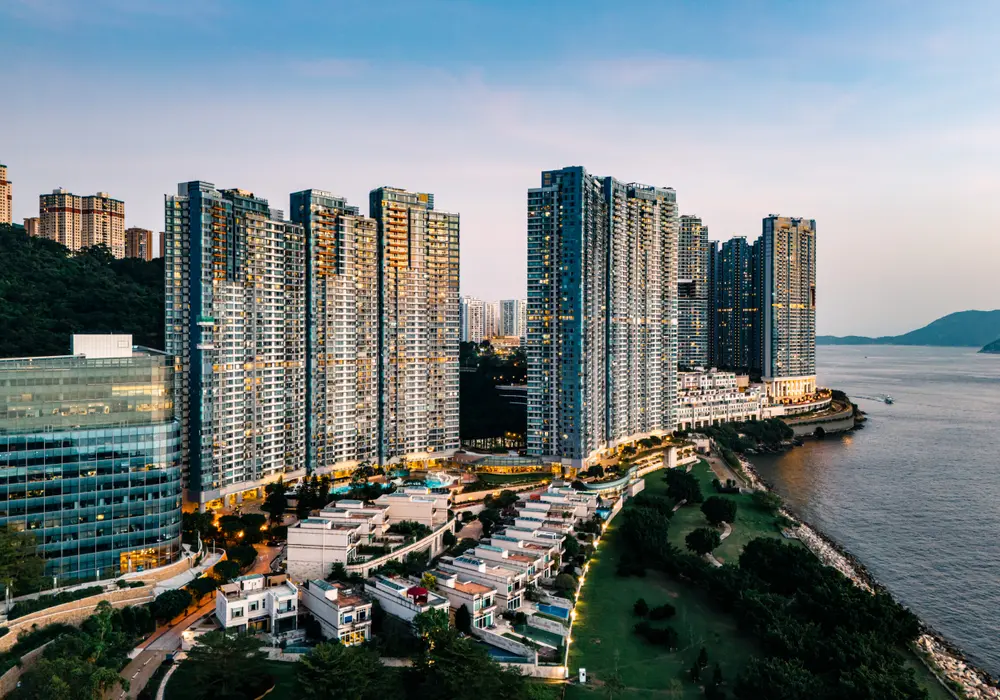
Housing 101: A Quick Guide for Novice Hongkongers
- 31 Jul 2024
- Living & Tax
For individuals moving to a new city, identifying suitable accommodation is a key consideration. Where urbanity and nature coexist harmoniously, Hong Kong is a cosmopolitan metropolis that embraces unique ways of life, attracting global talent to make it their home.
At 1,104 sq. km, land mass in Hong Kong is valuable, but far from unavailable. The city’s residential market offers a large variety of housing types and lifestyle options, from high-rise apartments in the heart of the city, ultra-lux homes perched along gentle hillsides, to well-connected new town condos and tranquil village houses settled close to nature. While apartments are generally the most popular due to their practicality, convenience, and wide availability across the city, family houses with gardens also serve as an option on the luxury side.
Buying a home in Hong Kong
As part of the government’s effort to promote policy realignment and economic development, a recent policy change was implemented to benefit newcomers in Hong Kong. Effective since 28 February 2024, all demand-side management measures for residential properties have been cancelled, indicating the removal of Special Stamp Duty (SSD), Buyer’s Stamp Duty (BSD) and New Residential Stamp Duty (NRSD) from residential property transactions. To arriving talent, this posts an excellent opportunity to enter the homebuying market with reduced expenses.
In short, if you are looking into purchasing a property in Hong Kong, the city’s diverse portfolio allows you to do so at a lower cost, regardless of what lifestyle you favour:
- If you prefer living near your workplace to shorten your commute time, consider exploring outside the commercial and residential district like Central. In surrounding areas like Sheung Wan and Sai Ying Pun, traditional tenement buildings and walk-up apartments are offered extensively with reasonable pricing, making them an ideal choice for mid- to long-term residency. For more information, please refer to our previous article, which includes steps to finding suitable housing.
- The most widely available housing option, modern high-rise apartments are especially prominent in Hong Kong’s new town areas. Well-connected by public transportation, they offer both proximity to city centres and a calmer suburban pace.
- For nature lovers, village homes are a spacious and economical option. Better yet, the city’s expansive and highly efficient public transportation network means you’re never too far away from urban action, even if you’re tucked comfortably in the tranquil countryside.
- To accelerate growth in the digital economy, the Hong Kong government has made tremendous effort in facilitating a mature Innovation & Technology (I&T) community. If you are an I&T talent or entrepreneur, alternative housing options like Innocell may be the solution. Established by the Hong Kong Science and Technology Park, it is a partnership project that provides accommodation and networking opportunities for the tech and startup community. To learn more about support for the I&T industry and related fields, take a read of this HKTE article.
Renting a place in Hong Kong
For newly arrived talent, renting is an exemplary choice that allows for affordable living and exploration in Hong Kong. From studios to townhouses, the city offers a wide variety of housing. A relatively new and rising option, serviced apartments are popular amongst those who enjoy an extra layer of value-added service to complement their daily routine. Serviced apartments in Hong Kong typically offer these features:
- At sizes under 1,000 sq. ft., typically in the form of studios and one-bedroom or two-bedroom apartments, many of these properties are equipped with bathrooms and open kitchens.
- They are usually polished living spaces with weekly housekeeping services, designed for recently arrived talent or those who are still weighing their accommodation options.
- Another benefit includes flexible leasing contracts, which often allow tenants to stay for a short- to mid-term period before they settle on a more permanent living space.
- Many serviced apartments are also located near key commercial districts, which is ideal housing for newly arrived talent.
Home-shopping tips and tricks
There are many popular property apps that make home shopping more accessible. Once you have shortlisted a potential home, you can use the bilingual search engine provided by the Property Information Online (PIO) to locate its property record and obtain essential information such as saleable area, age, and permitted occupation purposes. While it is possible to complete a property transaction directly with the owner, potential risks involving safety, legality, and fraud may exist. To protect your rights and interests, it is advised to consult a licensed estate agent while searching for accommodation. Prior to engaging their services, you and your agent must also sign an agency agreement, specifying details such as the validity period of the agreement, the duties of the agent, and the amount of commission to be agreed upon by both parties.
Whether you are renting or buying, here are a few tips to keep in mind once you have decided to settle down in Hong Kong. Before the search for your ideal home begins, make sure to familiarise yourself with the layout of a typical Hong Kong apartment — consisting of a combined living-dining room, kitchen, utility or laundry area, two or three bedrooms, and bathrooms all situated on one level. Some units come with balconies, while top-floor units have exclusive access to the roof area above. Additionally, modern estates often provide communal facilities, including swimming pools, tennis and squash courts, clubhouse activities and gymnasiums, billiards and badminton rooms, and play areas for children.
If you have developed a basic concept of the typical apartment, be sure to take note of these household details before you sign on:
- Look for any water stain on the ceiling, bay windows and walls to check for water leakages
- Inspect electrical wiring, switches, water pipes, and toilets, etc., to see if they are working properly
- Check if there are any illegal alterations to the property and seek professional advice if necessary
- Enquire whether the property is occupying any common areas
- Enquire whether furniture, electrical appliances and decoration are included in the sale of property; if yes, specify the inclusion in the agreement of sale and purchase
- Check who are in occupation or possession of the property, validate their identities, and whether they hold any property interests
- Confirm that the property is used for residential purposes; avoid living in industrial or commercial properties to prevent possible future legal and financial risks
- If the property is used for residential purposes, ascertain whether it is subject to restrictions under the Housing Ordinance; otherwise, confirm whether a Letter of Removal of Alienation Restriction has been issued and that the subletting lease does not contravene relevant requirements
- If a property owner requests a large sum for rent payable in advance, beware of the potential risk for fraud. In general, tenants are required to pay a deposit equivalent to two months' rent, followed by payment of one month’s rent.
- Check if your real estate agent possesses a valid license before signing a contract. For more information, you may also refer to the Estate Agents Authority’s “A Guide to Tenancy" and “Tenancy Guide for Non-local Students in Hong Kong”.
Like other cities in the world, both the tenancy agreement and the sale and purchase agreement in Hong Kong are legally binding. Before committing to a contract, verify that you have sufficient knowledge of the property. For more information on accommodation or integrated settlement services, visit our Supporting Services page.
Recent posts
-

Guide to hiring a domestic helper in Hong Kong
- 20 Jun 2025
- Living & Tax
-

Hong Kong: a family-friendly city
- 19 Jun 2025
- Living & Tax
-

Pet adoption: Second chances and forever homes
- 19 Jun 2025
- Living & Tax
-

Understanding Hong Kong's matrimonial process
- 13 May 2025
- Living & Tax
-

Go green: Embracing eco-friendly lifestyles in Hong Kong
- 06 May 2025
- Living & Tax
-

Step into wellness: Hong Kong’s sports facilities and activities
- 02 May 2025
- Living & Tax
-

Explore Hong Kong’s public health services
- 22 Apr 2025
- Healthcare & Welfare
-

Overview of Hong Kong’s Education System
- 17 Apr 2025
- Education
-

A guide for your children transitioning to Hong Kong primary & secondary schools
- 17 Apr 2025
- Education
-

Practical travelling: Owning a car in Hong Kong
- 11 Apr 2025
- Living & Tax

